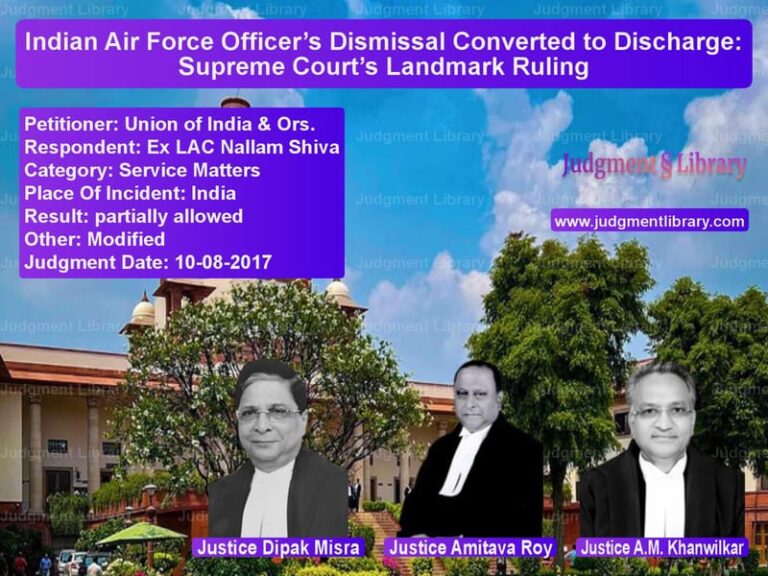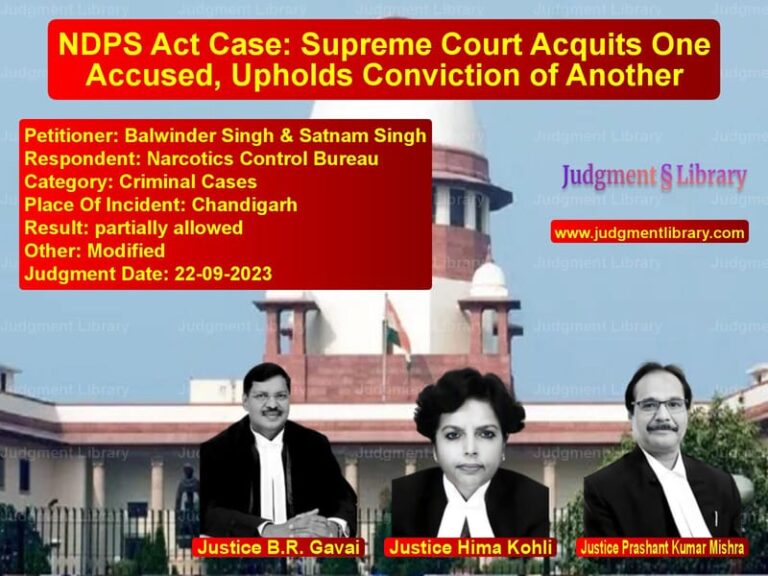Supreme Court Rules on Land Ownership Dispute: Res Judicata and Government Claims Examined
The Supreme Court of India, in its judgment dated August 9, 2019, addressed a significant legal dispute concerning land ownership and the principle of res judicata in the case of State of Andhra Pradesh & Ors. v. B. Ranga Reddy (D) by LRs & Ors.. The case revolved around multiple civil suits involving the title and possession of certain parcels of land claimed by both private parties and the state government.
Background of the Case
The dispute arose from three separate suits:
- Original Suit No. 274 of 1983: Filed regarding 6.08 guntas of land in Khairatabad Village.
- Original Suit No. 276 of 1983: Concerned 3 guntas of land in Khairatabad Village.
- Original Suit No. 141 of 1984: Related to 19.23 guntas of land in Rasoolpura Village.
The plaintiffs claimed ownership of the land, while the State of Andhra Pradesh argued that the land fell within Survey No. 43 of Bholakpur Village, which was a government-owned Shikkam Talab (Hussain Sagar Talab).
Findings of the Trial Court
The trial court conducted a joint trial for all three suits and made the following key observations:
- The plaintiffs in the first two suits failed to establish their title and possession over the land.
- The government also failed to prove that the land belonged to it under Survey No. 43 of Bholakpur Village.
- The plaintiffs in the third suit successfully established their ownership, and the government was directed to surrender possession of the suit property to them.
High Court Decision
The government appealed against the decision in the third suit, while the first two suits were not appealed. The High Court held that the findings of the trial court in the first two suits operated as res judicata against the government, as the state had not challenged those findings. The High Court dismissed the government’s appeal based on this reasoning.
Petitioner’s Arguments (State of Andhra Pradesh)
The government, represented by its counsel, contended:
- The findings in the first two suits were not decrees and, therefore, could not operate as res judicata.
- Since the state was not an aggrieved party in those suits, it had no reason to appeal against the dismissals.
- The principle of res judicata should apply only when a decree attains finality, which was not the case here.
Respondent’s Arguments (B. Ranga Reddy & Others)
The respondents argued that:
- The trial court had categorically held that the land did not belong to the government.
- The government was obligated to challenge these findings in appeal, failing which they became final.
- The High Court correctly applied the principle of res judicata in dismissing the government’s appeal.
Supreme Court’s Observations
The Supreme Court examined the statutory provisions of the Code of Civil Procedure (CPC), particularly Section 11 (Res Judicata) and Order XLI Rules 22 and 33. The Court made the following key observations:
1. Difference Between a Decree and a Finding
The Court emphasized that an appeal lies against a decree, not merely against a finding. It stated:
“A finding on an issue in a dismissed suit does not automatically operate as res judicata unless it has attained finality by way of an appeal.”
2. Right to Appeal and Cross-Objections
The Court clarified that a party fully succeeding in a suit need not file an appeal or cross-objection against findings that do not affect the final outcome. The government had the right to contest the findings in the ongoing appeal without having to file separate appeals in the dismissed suits.
3. Application of Res Judicata
The Court held that since the appeals in the first two suits were still pending, the findings in those cases had not attained finality. Therefore, the principle of res judicata did not apply.
4. Power of the Appellate Court
The Court noted that the appellate court has the power under Order XLI Rule 33 CPC to set aside findings even if they were not specifically challenged in appeal.
Final Verdict
The Supreme Court allowed the appeals filed by the government and set aside the High Court’s ruling, concluding that:
- The findings in the first two suits did not operate as res judicata against the government.
- The government was entitled to contest those findings in the appeal concerning the third suit.
- The case was remanded for fresh adjudication.
Impact of the Judgment
This ruling has significant implications for civil litigation and the doctrine of res judicata:
- Clarifying Res Judicata: The judgment clarifies that a finding does not become binding unless it is part of a final decree.
- Strengthening Government Claims: The ruling provides legal clarity for government entities dealing with land disputes.
- Guidance for Future Cases: The decision establishes a precedent for handling multiple suits arising from the same dispute.
Conclusion
The Supreme Court’s decision in State of Andhra Pradesh v. B. Ranga Reddy is a landmark ruling on the application of res judicata and the rights of parties in civil appeals. By setting aside the High Court’s decision, the Court has ensured that legal principles are applied correctly and that procedural technicalities do not lead to an unjust outcome.
This case serves as an important reference for litigants and courts dealing with complex land disputes and procedural aspects of civil appeals.
Petitioner Name: State of Andhra Pradesh & Ors..Respondent Name: B. Ranga Reddy (D) by LRs & Ors..Judgment By: Justice Hemant Gupta, Justice L. Nageswara Rao.Place Of Incident: Andhra Pradesh.Judgment Date: 09-08-2019.
Don’t miss out on the full details! Download the complete judgment in PDF format below and gain valuable insights instantly!
Download Judgment: State of Andhra Prad vs B. Ranga Reddy (D) b Supreme Court of India Judgment Dated 09-08-2019.pdf
Direct Downlaod Judgment: Direct downlaod this Judgment
See all petitions in Property Disputes
See all petitions in Landlord-Tenant Disputes
See all petitions in Damages and Compensation
See all petitions in Judgment by Hemant Gupta
See all petitions in Judgment by L. Nageswara Rao
See all petitions in allowed
See all petitions in Remanded
See all petitions in supreme court of India judgments August 2019
See all petitions in 2019 judgments
See all posts in Civil Cases Category
See all allowed petitions in Civil Cases Category
See all Dismissed petitions in Civil Cases Category
See all partially allowed petitions in Civil Cases Category







